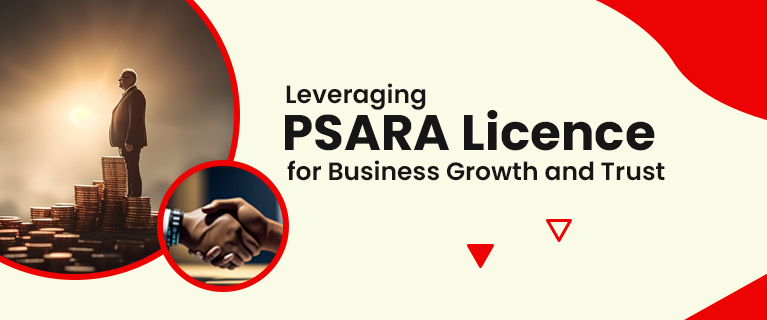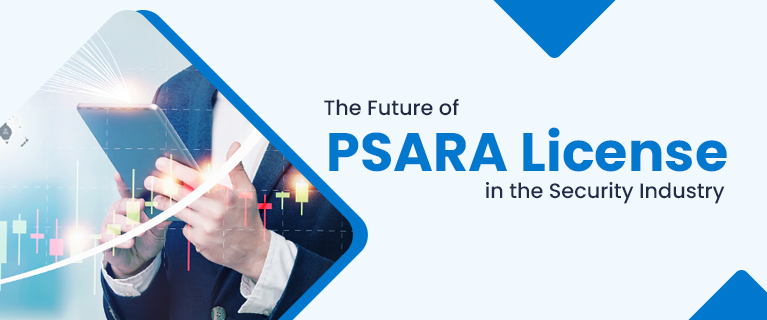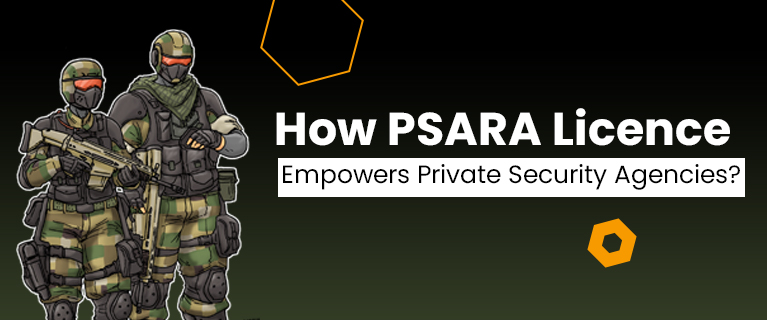Leveraging PSARA Licence for Business Growth and Trust
Private security is an essential aspect of maintaining safety and security in today's dynamic world. Private security agencies play a crucial role in safeguarding individuals, properties, and events. Obtaining a PSARA Licence is not only a legal requirement for operating a private security agency but also a valuable asset that can be leveraged for business growth and establishing trust among clients. In this blog, we will explore how obtaining and leveraging a PSARA Licence can contribute to business growth, enhance credibility, and foster trust within the private security industry.
Read also this -: Protecting Digital Assets with PSARA License1. Compliance with Legal Framework:
Obtaining a PSARA Licence ensures that private security agencies operate in compliance with the law. The PSARA Act and its regulations define the necessary qualifications, guidelines, and standards for the functioning of private security agencies. By obtaining a licence, agencies demonstrate their commitment to adhering to the legal framework and upholding industry standards. This compliance not only promotes ethical business practices but also builds trust among clients, who are assured of the agency's adherence to legal requirements.
2. Enhanced Credibility:
Having a PSARA Licence enhances the credibility of a private security agency. The licence serves as a testament to the agency's professionalism, competence, and adherence to quality standards. Clients and stakeholders often prefer engaging licensed agencies as they are perceived to possess the necessary expertise, training, and infrastructure to provide reliable and efficient security services. The credibility associated with a PSARA Licence can significantly differentiate a licensed agency from unlicensed competitors, giving it a competitive edge in the market.
3. Business Expansion Opportunities:
A PSARA Licence opens up new avenues for business expansion and growth. Licensed agencies can explore a wide range of security-related services and cater to diverse client requirements. With a valid licence, agencies can bid for government contracts, secure partnerships with corporate clients, and participate in tenders and projects that mandate the engagement of licensed security agencies. The licence acts as a gateway to opportunities in sectors such as commercial establishments, residential complexes, industrial sites, educational institutions, and event management, enabling agencies to expand their client base and revenue streams.
4. Trust and Confidence of Clients:
Trust is a vital element in the private security industry. Clients rely on security agencies to protect their assets, ensure the safety of their premises, and safeguard their well-being. A PSARA Licence instils trust and confidence among clients, as it demonstrates the agency's compliance with legal requirements, adherence to industry best practices, and commitment to professionalism. Licensed agencies are perceived as reliable, accountable, and capable of delivering quality security services, fostering long-term relationships with clients and securing their trust.
5. Access to Specialized Training and Resources:
The process of obtaining a PSARA Licence involves meeting specific requirements related to personnel training, infrastructure, and resources. To obtain and maintain the licence, agencies must invest in the continuous training and upskilling of their security personnel. This commitment to professional development enhances the capabilities of security personnel and equips them with the knowledge and skills to handle diverse security challenges effectively. Licensed agencies have access to specialised training programs, advanced equipment, and resources that enable them to provide superior security services to clients.
6. Collaboration with Law Enforcement Authorities:
A PSARA Licence fosters collaboration and partnership with law enforcement authorities. Licensed agencies are seen as valuable allies in maintaining law and order, preventing crime, and ensuring public safety. The licence provides a platform for agencies to establish strong connections with local police departments, engage in community policing initiatives, and contribute to the overall security ecosystem. Collaboration with law enforcement authorities not only strengthens the agency's credibility but also enhances its effectiveness in delivering comprehensive security solutions.
7. Adapting to Changing Industry Standards:
The private security industry is dynamic and continually evolving. Government regulations, technological advancements, and emerging security threats drive changes in industry standards. Holding a PSARA Licence positions an agency to adapt to these changes and stay abreast of evolving industry requirements. Licensed agencies are more likely to embrace innovation, implement advanced security technologies, and adopt best practices to meet the changing needs of clients. This adaptability and commitment to staying current with industry standards further enhances their credibility and relevance in the market.
Read also this -: Benefits of Acquiring a PSARA LicenseConclusion
A PSARA Licence is not just a legal requirement for operating a private security agency in India, but also a valuable asset that can be leveraged for business growth and establishing trust. Licensed agencies benefit from compliance with the legal framework, enhanced credibility, and expanded business opportunities. They inspire trust and confidence among clients, enabling long-term relationships and fostering a positive reputation within the industry. By investing in the necessary training, resources, and infrastructure, licensed agencies can deliver high-quality security services, adapt to changing industry standards, and contribute to a safer and more secure environment.




Comments
Post a Comment